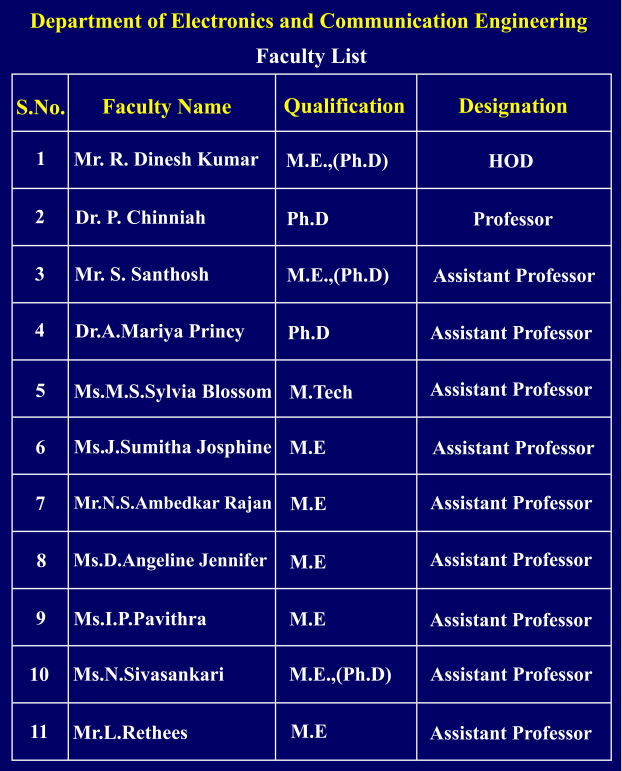The Department of Electronics and Communication Engineering was established in the year 2008 with an intake of 60, it increased to 120 in the year academic year 2011. The program is duly approved by AICTE and affiliated to Anna University. Electronics and Communication Engineering department is most attractive and preferred department to the student’s community. The young and dynamic department aspires to achieve global standards and competence with the untiring commitment of budding Engineering
The laboratory practical classes are conducted in systematic manner. The laboratories are well equipped with modern training facilities that cater to the requirements of the University syllabus as well as to architect the learning experience. Problems are solved during the tutorial hours with better clarity. Students are taken for Industrial visits twice per semester. The students are encouraged to deliver seminars, publish papers in both National / International Conferences in latest topics, thus promoting technical and communication skills.
Contacts
PO 1 : Engineering knowledge: Apply the knowledge of mathematics, science, engineering fundamentals, and an engineering specialization to the solution of complex engineering problems.
PO 2 : Problem analysis: Identify, formulate, review research literature, and analyse complex engineering problems reaching substantiated conclusions using first principles of mathematics, natural sciences and engineering sciences.
PO 3 : Design/development of solutions: Design solutions for complex engineering problems and design system components or processes that meet the specified needs with appropriate consideration for the public health and safety, and the cultural, societal, and environmental considerations.
PO 4 : Conduct investigations of complex problems: Use research-based knowledge and research methods including design of experiments, analysis and interpretation of data, and synthesis of the information to provide valid conclusions.
PO 5 : Modern tool usage: Create, select, and apply appropriate techniques, resources, and modern engineering and IT tools including prediction and modelling to complex engineering activities with an understanding of the limitations.
PO 6 : The engineer and society: Apply reasoning informed by the contextual knowledge to assess societal, health, safety, legal and cultural issues and the consequent responsibilities relevant to the professional engineering practice.
PO 7: Environment and sustainability: Understand the impact of the professional engineering solutions in societal and environmental contexts, and demonstrate the knowledge of, and need for sustainable development.
PO 8 : Ethics: Apply ethical principles and committees’ professional ethics and responsibilities and norms of the engineering practice.
PO 9 : Individual and team work: Function effectively as an individual, and as a member or leader in diverse teams, and in multidisciplinary settings.
PO 10 : Communication: Communicate effectively on complex engineering activities with the engineering community and with society at large, such as, being able to comprehend and write effective reports and design documentation, make effective presentations, and give and receive clear instructions.
PO 11 : Project management and finance: Demonstrate Knowledge and understanding of engineering and management principles and apply these to one’s own work, as a member and leader in a team, to manage projects and in multidisciplinary environments.
PO 12 : Lifelong learning: Recognize the need for and have the preparation and ability to engage in independent and life-long learning in the broadcast context of technological change.
PSO 1 : Able to integrate the concepts of Science, Mathematics and Engineering in the Development of real time Electronic systems for different Applications
PSO 2 : Acquire proficiency in latest Electronic Hardware and Software Design tools through Innovative Methodologies.
PSO 3 : Solve complex problems using Technical and Management skills either Independently or in Team
PEO1(Competent Professional): To add values to the Organization as an Employee at various levels, by refining the systems and processes using relevant methods and tools learnt from the Programme.
PEO2 (Entrepreneurship): To be successful Entrepreneur through product development and service with societal traits acquired through the Programme
PEO3 (Higher education and life long learning): To update knowledge through higher studies and lifelong learning required for professional Carrier.
Aims to make the students learn to deepen their knowledge in basic concepts in science and Engineering and apply modern technological tools and develop practical skills to excel in professional careers involving technical and non-technical skills needed.
